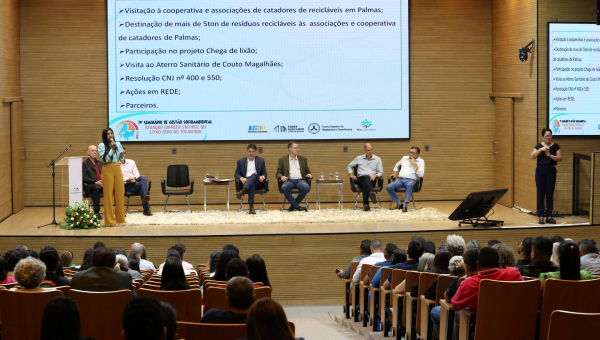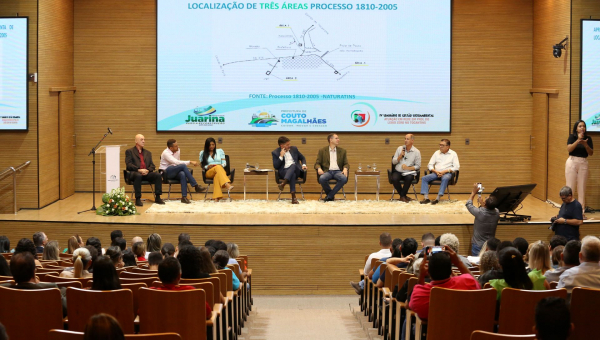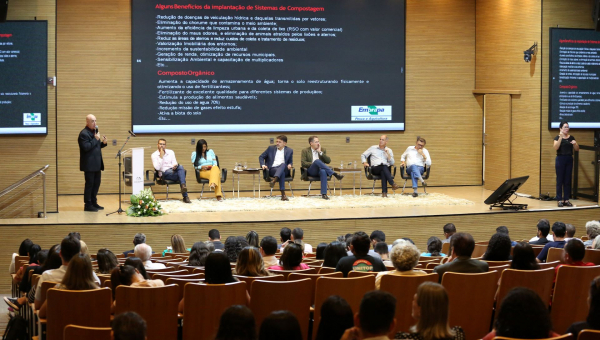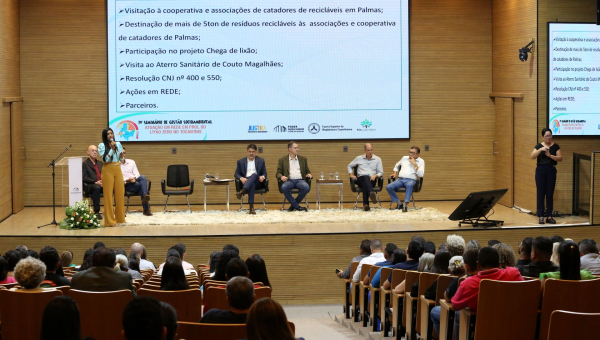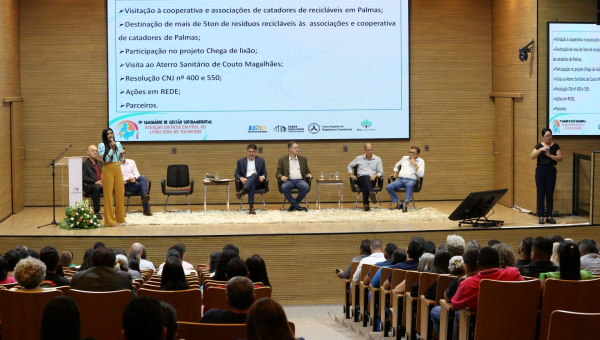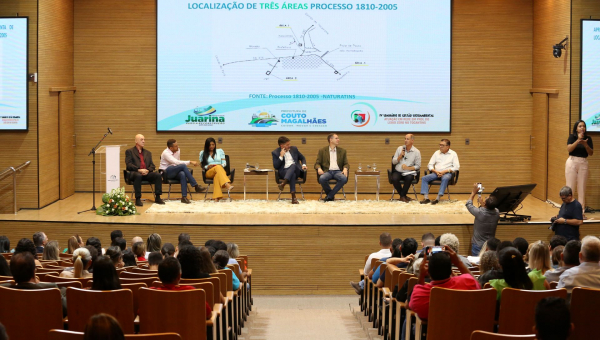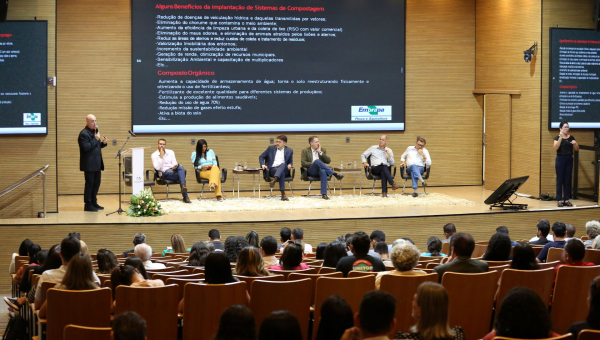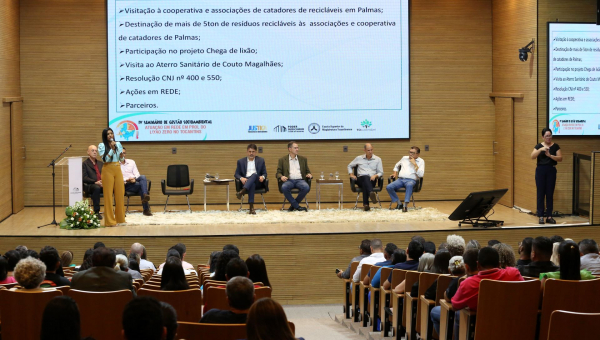
Alternatives for landfill facilities and the end of garbage dumps in the municipalities of the State of Tocantins were discussed on Friday afternoon (June 14th) during the panel on Sustainable Solutions for Waste Management, part of the programming of the IV Environmental Management Seminar, held in the auditorium of the Court of Justice of the State of Tocantins (TJTO).
Aurélio Picanço, who holds a doctorate in hydraulics and sanitation and is a Professor at the Federal University of the State of Tocantins (UFT), opened the panel with the topic: "Application of consortium solutions for solid waste management applied to the reality of the State of Tocantins". He gave as an example the project for an efficient and sustainable system for the final disposal and treatment of solid waste for the Intermunicipal Consortium for Sustainable Development of the Manuel Alves River Valley, with the aim of promoting environmental preservation and complying with the relevant legal regulations, contributing to public health and the quality of life of the local community.
The Consortium encompasses eight municipalities in the southeastern region of the State - Almas, Dianópolis, Novo Jardim, Porto Alegre, Taipas do Tocantins, Chapada da Natividade, Conceição do Tocantins and Rio da Conceição - and, according to the Professor, the landfill, which is medium-sized and will have a capacity of up to 40 tons, is only being consolidated through partnerships, including with the private sector. But for the project to be a success story, Aurélio Picanço said that 12 more towns in the region, established in the State Waste Plan, need to be involved.
"The landfill would be exactly in this region that is being built, near the city of Dianópolis, which is the largest municipality in the region. What we want, and this is the challenge of the Consortium, is to bring these municipalities into the Consortium. Then, if we need to expand this landfill in the future, we already have a landfill. We won the area, the company paid for the environmental licensing and the budget is very close to 3.5 million, so we can get a 40-ton landfill. So it's something we can do. If we were to make a landfill for each municipality, it would be the same 5, 6, 7 million for each municipality. We're doing one for 8 municipalities and this amount will be apportioned operationally later to each of these municipalities. That's why the consortium tool is the model we've been following to achieve zero landfill in our State."
Sustainable TO Network
Cinthia Barbosa Pires Azevedo, an Environmental Engineer and employee of Cogersa - the Socio-Environmental Management and Social Responsibility Coordination Office of the Judiciary of the State of Tocantins (PJTO), spoke about the theme: "Network Action - Overview of Results", presenting the Sustainable TO Network, an initiative of the PJTO in partnership with several bodies and institutions.
The Judiciary official explained the Sustainable Logistics Plan, presented the Sustainable Logistics Plan Management Committee, chaired by Justice Ângela Prudente, and pointed out sustainable actions and strategies, including the Socio-Environmental Information and Management System (Siga), an online platform that acts as a database, recording and monitoring the performance of the TJTO in the environmental, economic and social areas, within the goals established by the Sustainable Logistics Plan, aligned with the Sustainable Development Goals of the 2030 Agenda of the UN.
“All problems and solutions are discussed in a network," she said, adding that the Court of Justice is "a success story in networking".
Couto Magalhães landfill site
The Mayor of the city of Couto Magalhães, Júlio César Brasil, opened the theme on "Waste Management - Challenges in Landfill Management". He spoke about the whole process, the difficulties until the landfill of the municipality is up and running in November 2021."
"The health issue arose because our landfill was not within the urban area. If the city wanted to grow, it had to solve that problem, but we didn't realize it would be so difficult," he said, describing the difficulties encountered, especially in drawing up the project and obtaining the environmental licenses.
"In 2021, we were able to put together a proper technical team and we were fortunate that the technicians began to speak a single language and things started to move forward and we were able to communicate there, yes, a more agile communication within the environmental agencies and things flowed and at the end of 2021 we were finally able to reacquire the implementation and operate licenses and we began to operate the landfill within the criteria that the law required."
He stressed that the landfill was only implemented because of insistence. "We had the stubbornness to return to the process, and to this day we think that it doesn't work the way it should, or the way we'd like it to, but it's working, right?"
The Couto Magalhães landfill is working so well that it now also receives waste from the neighboring town of Juarina. Mayor Manoel Ferreira said that the partnership with the municipality was the most viable option, given the deadlines that were coming to an end and also the impossibility of forming a consortium with other towns.
"So we held the meeting, went to the office of the Prosecutor, the City Hall of Juarina. We did everything before the deadline for the TAC of the State Prosecution. Then, on December 15th, all the waste was taken to the landfill in the city of Couto Magalhães," he said, adding that the waste is taken every week. "We made this partnership. We calculated their maintenance costs. We made a proposal. We got the councils to agree and we take away our garbage. So it's a problem solved".
Organic Waste
Closing the panel, scientific researcher Divonzil Gonçalvez Cordeiro from Embrapa presented the topic: "Organic waste in the context of zero landfill". He emphasized that organic waste is not garbage "it's a product that is highly usable and profitable", and that irregular disposal is not just a problem in the State of Tocantins, but for the entire planet. "Our responsibility is greater than we realize".
And in this educational process, he talked about working with schools in the city of Palmas, where, according to him, children are the best multipliers. Alternative solutions include composting, which is already being carried out in schools in the capital.
"We're working with Semarh, with the City Hall, with Seinfra, we're working with the Environment Foundation, with the universities, because then things, if one dies the other continues, if we concentrate this in one institution, they won't have a guarantee of continuity."
The panel was coordinated by Marcello Lelis, Secretary for the Environment and Water Resources of the State of Tocantins.




